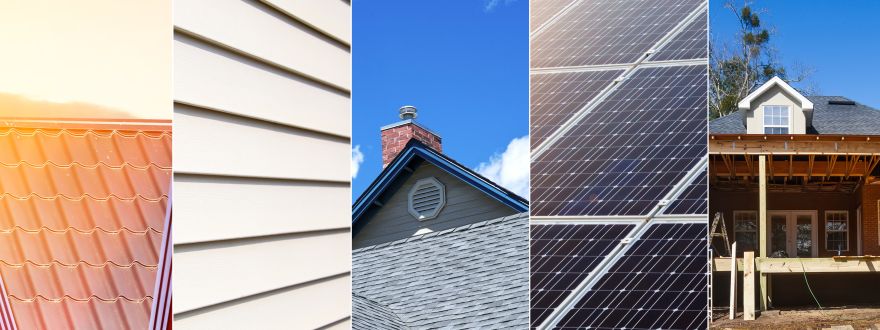
As in all walks of life, sustainability and energy efficiency are a leading trend in the real estate industry. Not only do homeowners want to take steps to keep increasing utility costs under control, but they want to feel like they are doing their part to ensure the future of the planet.
To this effect, it should come as no surprise that energy-efficient renovations are some of the most trending projects in the industry. To help you sort through some of the most popular, energy-efficient projects to perform, keep reading for an in-depth breakdown of smart renovations for a sustainable home.
Fortify the Siding
Fortifying the siding is a critical aspect of creating a more sustainable home, as it provides a primary layer of defense against unwanted air and moisture transfer. By creating a more airtight building envelope that prevents air and moisture ingress, upgraded siding can help to reduce energy consumption by keeping the home cooler in the summer and warmer in the winter.
When researching a siding project, many people compare hardie board vs wood siding. While hardie board does have some benefits, it is much heavier and difficult to work with than traditional wood. In addition, while it likes to market its wood-look products, it simply cannot match natural wood siding in terms of rustic beauty. As such, well-treated wood siding leverages wood’s natural insulation features and remains one of the top siding products on the market in terms of sustainability and aesthetics.
Upgrade the Windows
Windows play a crucial role in the sustainability of a home. Upgraded windows can enhance energy efficiency, reduce utility bills, and increase comfort levels over cracked and degraded predecessors. Windows should be upgraded to at least double-paned, energy-efficient glass. Such windows can reduce heat loss and gain by up to 30%, helping to reduce energy costs.
For more innovative window solutions, hurricane-grade storm windows are designed to withstand severe weather conditions. They are impact-resistant and can protect the home from damage caused by high winds and debris. These windows are also energy-efficient, as they help to reduce air leakage and heat transfer.
Smart windows are another option for sustainable homes. These windows can change their thermal conductivity based on the exterior weather. In warm weather, they can reduce heat transfer into the home, while in cold weather, they can help to keep heat inside. Smart windows can also be controlled remotely, allowing homeowners to adjust the temperature of their homes from anywhere.
Radiant Floor Heating
Radiant floor heating is a great option for creating a more sustainable home. It is a type of heating system that directly heats the floor instead of warming up the ambient air. This makes it more efficient than forced air systems, which can lose heat through drafts and convection. Radiant floor heating can be installed under a variety of floor coverings, including carpet, tile, and wood. It is also a low-maintenance system that can last for decades. It has been a popular option as electric heat for basement for some time but is now gaining traction in other areas of the home looking for high-efficiency heating.
Modernize the Roof
The roof has the important job of protecting your home from the elements, making it one of the most important factors for creating an energy-efficient home. A high-quality roof can help reduce heat loss in the winter and keep your home cool in the summer, which can lead to significant savings on your energy bills. On the flip side, a damaged roof can lead to higher utility costs.
There are a number of sustainable roofing materials on the market that do a wonderful job of withstanding the elements, including composite shingles and metal roofs. Composite shingles are made from a combination of recycled materials, such as plastic and fiberglass, and they are designed to mimic the look of traditional shingles. Metal roofs are also a sustainable option known for their durability and longevity.
They also are highly reflective, guaranteeing that the roof does not absorb too many warming sun rays during the summer that cause the AC to kick into overdrive.
Get Innovative With Insulation
There are many types of insulation that can improve R-value and reduce energy consumption, such as spray foam insulation metal building products and standard fiberglass batts. However, there are also some more creative insulation products on the market that can accomplish energy savings while also scoring higher for recyclability and sustainable sourcing.
Hemp insulation is made from the fibers of the hemp plant. It is a sustainable option because hemp is a renewable resource that can be grown and harvested without the use of pesticides or herbicides. Hemp insulation is also biodegradable and compostable.
Sheep wool insulation is another sustainable option. It is made from the wool of sheep, which is a natural and renewable resource. Sheep wool insulation is also fire-resistant and can help to improve indoor air quality.
Denim insulation is made from recycled denim jeans. It is a sustainable option because it helps to reduce waste. Denim insulation is also breathable and can help to regulate indoor humidity levels.
Get Started on a More Sustainable Home Today
Homes that do not have the latest sustainability and energy efficiency features will have a hard time standing out in a rapidly evolving real estate market. For more information on how renovating for sustainability may affect your insurance premiums, contact Barber Insurance Agency today for a consultation!
Roger Marx is a freelance writer that loves sharing his knowledge and expertise on the latest trending building and design products. He lives in Minneapolis, Minnesota where he enjoys spending time with his wife and working on backyard projects in his spare time. Roger’s work as a freelance writer can be found on Building Product Advisor, a construction industry resource site





